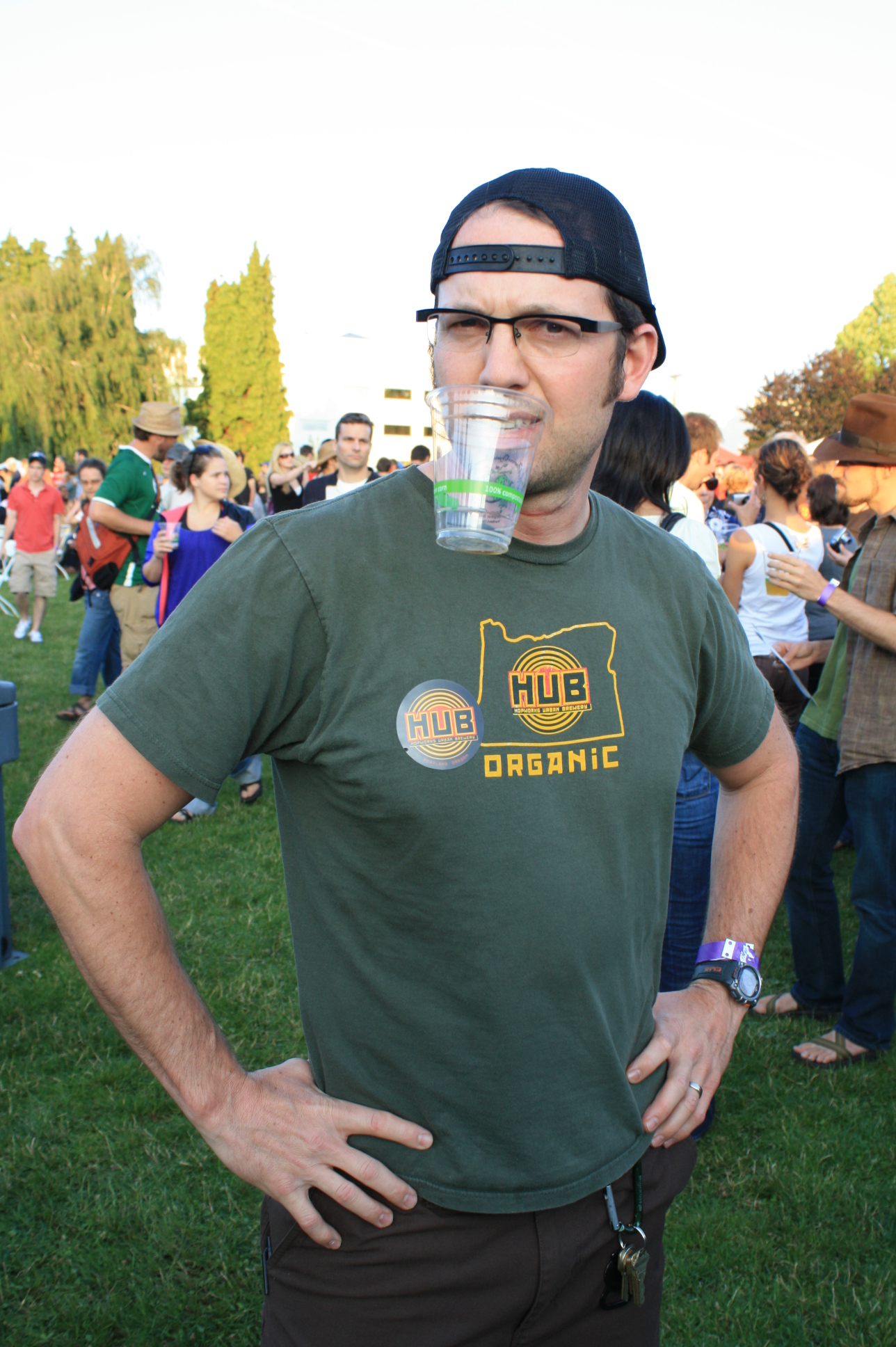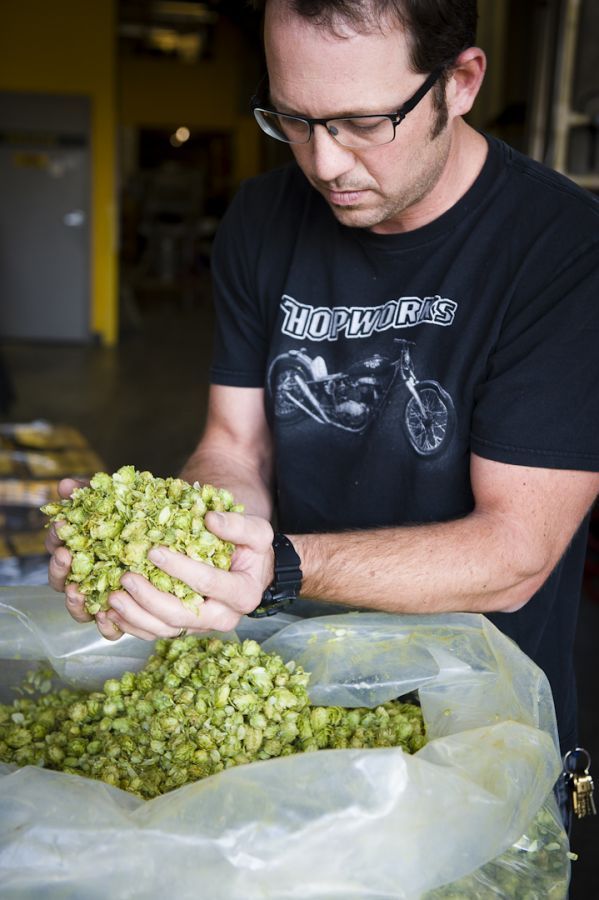 Just as we sat down, the owner, CEO, and Brewmaster of Portland’s Hopworks Urban Brewery (HUB) Christian Ettinger pointed out to me with giddiness the efficiency and brightness of the new LED lights he’d recently installed. Environmentally friendly technology and repurposed materials are found throughout their “mothership” brewery/restaurant complex. Just last year, Ettinger’s Portland-based HUB received Oregon’s Sustainability Award as “Grand Champion,” not a small feat when considering the green-crazy passions found around these parts. Whether he’s rafting and camping on the Rogue River with local craft beer geeks, doing a 200-mile bike ride from Seattle to Portland for various charities, or just showing up at festivals to revel with the rest of us, it’s clear this man lives to create an environmentally conscious beer community.
Just as we sat down, the owner, CEO, and Brewmaster of Portland’s Hopworks Urban Brewery (HUB) Christian Ettinger pointed out to me with giddiness the efficiency and brightness of the new LED lights he’d recently installed. Environmentally friendly technology and repurposed materials are found throughout their “mothership” brewery/restaurant complex. Just last year, Ettinger’s Portland-based HUB received Oregon’s Sustainability Award as “Grand Champion,” not a small feat when considering the green-crazy passions found around these parts. Whether he’s rafting and camping on the Rogue River with local craft beer geeks, doing a 200-mile bike ride from Seattle to Portland for various charities, or just showing up at festivals to revel with the rest of us, it’s clear this man lives to create an environmentally conscious beer community.
During the hour I spent on site, new coolers for the brewery were delivered, the new canning line was in the process of being calibrated, the Brewers Festival was just gearing up (where they had an excellent Belgian Pale Ale with organic pear juice called Two Tickets to Pearadise) and as I walked out the door, I briefly met the President and Head Brewer of Elysian Brewing in Seattle, Dick Cantwell. With so much happening, I was thankful to get in a few questions…
What was your first craft beer love?
When I was in high school, my mother worked for Marylhurst University and she was in charge of hosting German exchange teachers who were coming over for a three-week tour of Oregon. The wrap-up party was always at our house and my mom would always get a pony keg of BridgePort Blue Heron. Normally, my friends and I pretty much would have whatever beers we could sneak, which were usually Henry’s [Weinhard’s] if we had any money and Blitz if we didn’t have any money. But the first craft beer that really blew my mind was drinking on the front porch with these German exchange teachers. Those nights and that beer were what really started the journey for me.
![]() What came first, the Hopworks name, HUB, or the bike theme?
What came first, the Hopworks name, HUB, or the bike theme?
When you have to file for your brewery license, you have to have an LLC name. So our LLC first name was Beer Engine Brewery, a tip of the hat to the industrial nature of early breweries. Then it was Independent Brewing, probably just because I used to skate a lot. But the HUB thing was more about the most important mechanical invention of the modern world – the wheel – with the middle of that being the most important part of wheel. Then the metaphors are a mile deep: pizza, cycles of carbon, oxygen and water; the way the spokes radiate from the middle, of which the middle is the heart or the town hall, the social center, etc. It’s just so cool on so many levels and the shape looks badass too, so it all just evolved from there… so we have a main ingredient (hops), our environment (urban), and of course, we’re a brewery. It all fell into place pretty easily.
How did you feel about the 32% purchase of the Craft Brew Alliance (CBA) by Anheuser-Busch InBev?
You know, it’s interesting…as breweries grow, they each have a different set of criteria. I’ve got just my wife and I, plus a loan, right?…As an independent, my number one goal is to create a thriving business with world-class beer and food made as sustainably as possible and have a nice business to give to my kids if they want it. I’m proud of CBA’s success. They’re friends, and I’ve used a lot of what I’ve learned from Widmer as a model for my business because they’re great.
Are there any plans to expand out of the Cascadia Region [Oregon, Washington, and British Columbia]?
Outside of Cascadia, I love the idea of just continuing to grow our distribution in a meaningful way. I have a 20-hour-a-week sustainability director who’s looking at different shipping methods and the carbon footprint of each one of those to really draw a radius. We’re more dependent upon the pounds of carbon required to get the heavy beer to market – by rail, by truck, or ship. And what we found is that rail is by far the most efficient way to move things around. If you truck beer to LA over land, you can go by rail to China and back. Or you could go straight to China by boat. If I’m comfortable with a truck to LA that means that I could, by rail, send beer to the East Coast and by ship be anywhere in the Pacific Rim. Is that the best thing for our brand? Is that the best use of precious liquid? It may not be, but at least we’re making a decision with a different set of criteria and sustainability is one of the most important aspects of our beer production. The idea of sending beer to the East Coast by truck makes me nauseous.
 How do you ensure organic quality?
How do you ensure organic quality?
The nature of organics requires you to be a little more aware and a little more in touch with the land and the people that are working the land. What we’re doing is maintaining the integrity of the raw ingredients that are grown…I like embracing the seasonality or year-over-year shifts in beer. If I have a three or four hop blend in my IPA, I’m going to support the agricultural process by talking early with the farmer to find out what’s going on in his world. Then I can plug in the different varieties based upon what’s most pest-resistant, which allows me to give him confidence in his experimentation process with new varieties. The new philosophy for me is: let’s be flexible, let’s be creative, let’s continue to improve our quality goals – and just like the best restaurants in the world, we’ll base our beers on what’s available locally and fresh for the season. Too often, brewers focus on consistency, which tends to trump staying local and sustainable.
What’s next?
Right now, we’re spending all our time trying to get our new rotary canning line going. We’re also working on variety with cider and have our application in for our winery license so we can make hard cider, addressing the gluten-free thing. Trying to share a brewery and winery license is a difficult thing because it hasn’t been done a lot. Then to segue, we’ll have a hybrid cider meets Belgian golden ale and that’s a low gluten option. We got our hard liquor license so we’re making white whiskey with our lager partnering with Clear Creek Distillery. We bought four Oregon oak barrels…and we’ve got them full of our white whiskey at 110 proof made from our lager, aging right now. With the sour program, we’ve got some dedicated starters of lacto, pedio, etc. That program’s a couple months in the making. Then we’ve got our bourbon barrel program, so with the sour thing, we can start to add in the starters and create our own house blends.
 American Craft Beer The Best Craft Beer, Breweries, Bars, Brewpubs, Beer Stores, And Restaurants Serving Serious Beer.
American Craft Beer The Best Craft Beer, Breweries, Bars, Brewpubs, Beer Stores, And Restaurants Serving Serious Beer.
